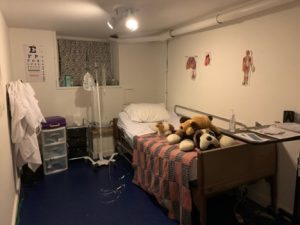I have known ever since I was a young girl carting books with me everywhere I went, that I wanted to work in a library. This past semester, Dr. Ganges gave a talk to English majors sharing her archival research experiences in Scotland. Her discussion made me think about pursuing a different career focus. This seemed like a similar niche about organizing information and having a real influence on how people access information, but different from the work of a librarian. My summer internship at the Northport Historical Society is a unique way to work on research skills that could lead to a future career either at a historical archive or special collection library. I am gaining skills that could be used in this area but working with local artifacts from the Northport (Long Island, New York) Community. Each artifact I process needs to be evaluated and cataloged. I have assessed photos, newspaper articles and other various historical items. By learning how to catalog these historical documents and artifacts, I am learning about how The Society also hosts various community events that will give me experience working and interacting with the members. This experience will broaden the opportunities of my career path to look at history more than just the bookshelves in a library. By having experience with special collections including historical documents my career path could be broadened to working in museums as an archivist.


Amelia Semple















